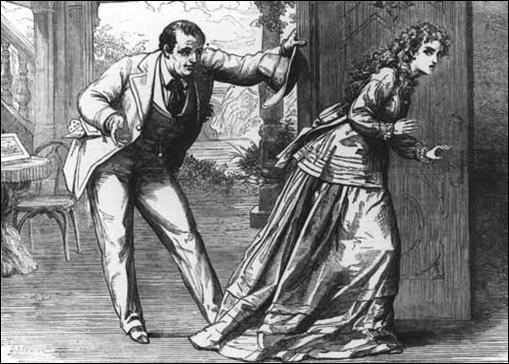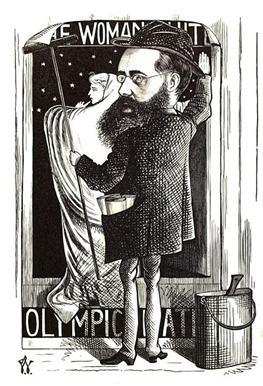Complete Works of Wilkie Collins (2009 page)
Read Complete Works of Wilkie Collins Online
Authors: Wilkie Collins
A Drama,
IN A PROLOGUE AND FOUR ACTS.
1871.
PERSONS REPRESENTED IN THE PROLOGUE.
SIR PERCIVAL GLYDE.
WALTER HARTRIGHT.
PROFESSOR PESCA.
MRS. CATHERICK.
ANNE CATHERICK.
DATE: March 31,1862.
PLACE: The village of Old Welmingham in Hampshire.


A contemporary cartoon satirising Collins
THE WOMAN IN WHITE.
PROLOGUE.
The action takes place partly in the burial-ground of Old Welmingham Church, partly in the vestry of the church. Time, morning. The sky bright, a fine spring day. The stage is divided into two portions. The portion on the actor’s right hand represents part of the interior of the vestry, the remainder being supposed to be continued off the stage on the right. The portion on the actor’s left hand, in like manner, represents part of the churchyard, showing the low grassy graves, the yew-tree, and the country beyond. An old oaken door leads from the churchyard into the vestry. A second door, inside the vestry, at the back, is supposed to communicate with the church. Above this second door an arched opening appears, used to light the vestry from the church. The only articles of furniture visible are an old flat-topped oaken press, containing the church registers, and an open iron stove. In the churchyard
ANNE CATHERICK
and
SIR PERCIVAL
are discovered.
SIR PERCIVAL,
dressed in mourning for his father, stands at the side on the left, looking towards
ANNE. ANNE,
dressed entirely in white of cheap and poor material, is seated, with her back turned on
SIR PERCIVAL,
and with a book in her hand, on one of the low graves near the vestry-door, looking at the distant view.
Sir P. (to himself).
What is the crazy fool doing there? If I don’t get rid of her she will see me open the vestry-door.
(He advances, and calls to her.)
Anne! Anne Catherick!
Anne (turning towards him).
You know my name?
(She rises.)
I know yours. Sir Percival Glyde.
Sir P.
What are you doing in the churchyard?
Anne.
Thinking of the dead.
Sir P.
Suppose you try a change. Take a walk in the village, and think of the living.
Anne.
I have no friends among the living. My friend is in heaven. Here is the book that she gave me.
(She points to the distance.)
There is the view which she said was the prettiest in all Hampshire. I look at it every day for her sake. Dear Mrs. Fairlie!
Sir P. (surprised).
Mrs. Fairlie? The late Mrs. Fairlie, of Limmeridge House?
Anne (eagerly approaching him).
Yes, Limmeridge House, Cumberland.
You
knew her? I didn’t like you at first. I like you now. Let’s shake hands.
Sir P. (putting her hand away from him contemptuously).
Where can Mrs. Fairlie have picked up this half-witted creature? Not in Cumberland, surely?
Anne.
Mrs. Fairlie didn’t always live in the north; she once lived here in Hampshire, in the time when her husband the captain was alive, in the time when I was a little girl. I’ll tell you all about it.
Sir P. (to himself).
How the devil am I to get rid of her?
Anne (eagerly).
It’s long since. I was only nine years old. I’m not happy at home now, and I wasn’t happy then. Mrs. Fairlie made up for it all. She pitied me, she taught me, she let me play with her little daughter —
Sir P. (interrupting her).
Very interesting!
(Pointing off on the left.)
There’s a bird in the lane; go and tell the rest of the story to the bird.
Anne (not heeding him).
Wait! you haven’t heard the best of it. Mrs. Fairlie used to dress me all in white, just as her own little girl was dressed. It amused her to see us together, we were so like each other. The cleverest people were taken in by it, they couldn’t tell which was which. Do you know Miss Fairlie? Are we like each other still?
Sir P. (to himself, interested for the moment).
They are as like as two peas. And Miss Fairlie is said to be the image of her father! The captain’s character was notorious among the women; Mrs. Catherick must have had attractions in her time —
Anne (repeating her question).
Am I like Miss Fairlie now she has grown up?
Sir P. (pursuing his thought).
Are they half-sisters without knowing it?
Anne.
You don’t notice my dress. I always wear white in remembrance of Mrs. Fairlie and her little girl. Why should they call me mad for doing that? Is it mad to be grateful to the only friend I ever had? Oh, how I cried when Mrs. Fairlie went away to Cumberland! I should like to see her grave, sir, in Limmeridge churchyard.
Sir P.
This is beyond endurance. (
To
ANNE.) Here, didn’t you say Mrs. Fairlie gave you that book? Let’s look at it.
Anne (giving it him).
Isn’t it pretty?
Sir P. (opening the book).
Beautiful! Show it to the bird in the lane.
(He throws the book off on the left.)
Follow your book. Good morning.
Anne.
You brute! How dare you treat Mrs. Fairlie’s gift in that way?
(She looks off.)
Oh, my poor book!
(She hurries out on the left.
SIR PERCIVAL
takes a large key from his pocket, and approaches the vestry-door.)
Sir P.
Now for it, before any more idlers come into the churchyard.
(He puts the key in the lock, and tries unsuccessfully to turn it.)
Hang the lock! It’s out of repair, like everything else in this hole of a place.
(ANNE
reappears softly at the side, with her book in her hand.)
Anne (to herself).
I’ll be even with him for throwing away Mrs. Fairlie’s book! What does he want in the vestry? I’ll slip round by the church and see.
(She goes out again.
SIR PERCIVAL
succeeds in turning the lock.)
Sir P.
I have done it at last.
(He looks round.)
Not a soul to see me!
(He enters the vestry, closes and locks the door on the inside, then puts the key in his pocket, and
looks at the press.)
Here’s where the church registers are kept! I am to wait in the vestry till Anne’s mother brings me the key of the press. She said she would come in by the door from the church.
(He indicates the door at the back.)
That door, I suppose.
(He looks again at the press.)
I’m running a desperate risk. Tampering with a register is felony. Penal servitude for me if I’m found out.
(He starts. A key is heard turning in the door leading into the church.)
Mrs. Catherick!
(The door opens, and
MRS. CATHERICK
appears on the threshold. She is over-dressed for her age and her station in life, has a bold look, and speaks in a hard, defiant manner.)
Mrs. C. (closing the door behind her).
You’re punctual to your time, Sir Percival.
Sir P.
Have you got the key of the press?
Mrs. C.
You must wait for the key.
Sir P.
Here?
Mrs. C.
No. (SIR PERCIVAL
approaches the door leading into the churchyard.
MRS. CATHERICK
checks him.)
Stop! I have something to say to you in private. It’s safest to say it here.
Sir P.
What do you want?
Mrs. C.
Women are naturally inquisitive, Sir Percival. I know something already of you and your family, and I want to know more. Are you a rich man?
Sir P.
Rich! I am over head and ears in debt.
Mrs. C.
Can’t you raise money on the estate?
Sir P.
What next, I wonder? No, I can’t raise a farthing. Any more questions?
Mrs. C.
Plenty more. Is it true that you are engaged to be married.
Sir P.
You’re a cool woman, if ever there was one yet. However, it’s no secret. I
am
engaged to be married?
Mrs. C.
Soon?
Sir P.
This summer.
Mrs. C.
To the rich Miss Fairlie, of Limmeridge House?
Sir P.
To the rich Miss Fairlie, of Limmeridge House. Now for a question on my side. These inquiries of yours have a meaning, I suppose? You’re trying after something. What is it?